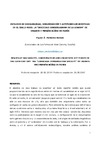Identificador persistente para citar o vincular este elemento:
https://accedacris.ulpgc.es/jspui/handle/10553/72863
| Campo DC | Valor | idioma |
|---|---|---|
| dc.contributor.author | Perdomo Batista, Miguel Angel | en_US |
| dc.date.accessioned | 2020-06-01T15:52:28Z | - |
| dc.date.available | 2020-06-01T15:52:28Z | - |
| dc.date.issued | 2019 | en_US |
| dc.identifier.issn | 1577-6921 | en_US |
| dc.identifier.other | Dialnet | - |
| dc.identifier.uri | https://accedacris.ulpgc.es/handle/10553/72863 | - |
| dc.description.abstract | El objetivo de este trabajo es examinar un texto español inédito que puede proporcionarnos datos significativos sobre las formas de sociabilidad en el siglo XVIII, ya que la sociabilidad es uno de los rasgos que caracterizan al siglo de la Ilustración. En este contexto, la conversación juega un papel central. Y el texto que analizamos no sólo es una muestra de ello, sino que también nos proporciona datos sobre su configuración como un género discursivo. Para entenderlo, tendremos que referirnos a ciertas cuestiones como el neologismo, el purismo lingüístico y el extranjerismo en el siglo XVIII. Veremos que nuestro examen nos permite aclarar cuestiones discutidas como la participación de la mujer en los salones, la configuración de la conversación como género discursivo y la trascendencia de éste, y el origen de actitudes lingüísticas como el purismo y el "casticismo" en relación con la neología y la extranjería. Por lo demás, y en el campo estrictamente metodológico, nuestro análisis combina el enfoque socio-histórico y el enfoque discursivo desde una perspectiva pragmática, y se aproxima al Análisis Discursivo Histórico o la Pragmática Histórica o Diacrónica | en_US |
| dc.description.abstract | The objective of this work is to examine an unpublished spanish text that can provide us with significant data on the forms of sociability in the 18th century, since sociability is one of the features that characterize the Enlighten ment century. In this context, the conversation plays a central role. And the text we analyze is not only a sample of it, but also provides us with data on how this was configured as a discursive genre. To understand it, we will have to refer to certain is sues such as neologism, linguistic purism and foreignism in the eighteenth century. We will see that our examination allows us to clarify throbbing issues such as the participation of women in the salons, the configuration of the conversation as a discursi ve genre and the transcendence of this, and the origin of linguistic attitudes such as purism and “casticismo” in relation to neology and foreignness. For the rest, and in the strictly methodological field, our analysis combines the sociohistorical approac h and the discursive approach from a pragmatic perspective, and approaches the Historical Discourse Analysis or the Historical or Diachronic Pragmatics. | en_US |
| dc.language | spa | en_US |
| dc.publisher | Universidad de Murcia | |
| dc.relation.ispartof | Tonos Digital | en_US |
| dc.source | Tonos digital [ISSN 1577-6921], n. 37 | en_US |
| dc.subject | 57 Lingüística | en_US |
| dc.subject | 63 Sociología | en_US |
| dc.subject.other | Siglo XVIII | en_US |
| dc.subject.other | Sociabilidad | en_US |
| dc.subject.other | Conversación | en_US |
| dc.subject.other | Neologismo | en_US |
| dc.subject.other | Purismo | en_US |
| dc.subject.other | 18th century | en_US |
| dc.subject.other | Sociability | en_US |
| dc.subject.other | Conversation | en_US |
| dc.subject.other | Neologism | en_US |
| dc.subject.other | Linguistic Purism | en_US |
| dc.title | Espacios de sociabilidad, conversación y actitudes lingüísticas en el siglo XVIII: la “Sociedad Conservadora de la Lengua” de Iriarte y Fernán Núñez en París | en_US |
| dc.type | info:eu-repo/semantics/Article | en_US |
| dc.type | Article | en_US |
| dc.identifier.url | http://dialnet.unirioja.es/servlet/articulo?codigo=7036684 | - |
| dc.description.lastpage | 0 | en_US |
| dc.identifier.issue | 37 | - |
| dc.description.firstpage | 32 | en_US |
| dc.investigacion | Artes y Humanidades | en_US |
| dc.type2 | Artículo | en_US |
| dc.contributor.authordialnetid | 3057748 | - |
| dc.identifier.dialnet | 7036684ARTREV | - |
| dc.utils.revision | Sí | en_US |
| dc.identifier.ulpgc | Sí | en_US |
| dc.description.sjr | 0,115 | |
| dc.description.sjrq | Q3 | |
| dc.description.dialnetimpact | 0,0 | |
| dc.description.dialnetq | Q2 | |
| dc.description.dialnetd | D5 | |
| dc.description.erihplus | ERIH PLUS | |
| item.fulltext | Con texto completo | - |
| item.grantfulltext | open | - |
| crisitem.author.dept | GIR Investigaciones literarias y lingüísticas en español | - |
| crisitem.author.dept | Departamento de Filología Hispánica, Clásica y de Estudios Árabes y Orientales | - |
| crisitem.author.orcid | 0000-0002-5019-2368 | - |
| crisitem.author.parentorg | Departamento de Filología Hispánica, Clásica y de Estudios Árabes y Orientales | - |
| crisitem.author.fullName | Perdomo Batista, Miguel Angel | - |
| Colección: | Artículos | |
Visitas
83
actualizado el 10-ene-2026
Descargas
172
actualizado el 10-ene-2026
Google ScholarTM
Verifica
Comparte
Exporta metadatos
Los elementos en ULPGC accedaCRIS están protegidos por derechos de autor con todos los derechos reservados, a menos que se indique lo contrario.
